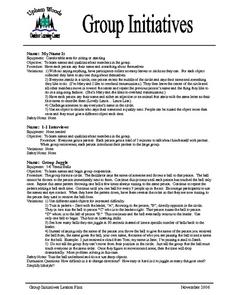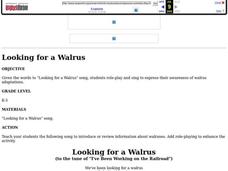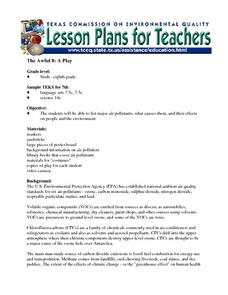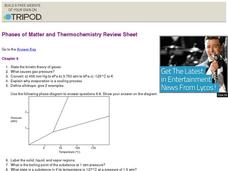Curated OER
What Have You Done?
For this have or have not done something worksheet, students write if they have or have not done things, join verbs and expressions, and write sentences. Students complete 3 activities.
Curated OER
Ancient Mediterranean Lands: Rome
Seventh graders research ancient Roman civilizations, trade routes, aqueducts, and agriculture. In this Ancient Rome lesson, 7th graders view a picture of the Roman Aqueduct Pont du Gard and discuss its use in ancient Rome. Students read...
Curated OER
Life is Weird
Students describe features of cold seep communities and list organisms that can be found in these communities. In this exploratory lesson students complete an activity and describe the process of chemosynthesis.
Curated OER
Rain, Rain, Go Away
Young scholars conduct a number of experiments involving evaporation and condensation. They view and discuss a video about the water cycle and then design posters about the rain based on the book "Cloudy With A Chance of Meatballs".
Curated OER
Arctic Centers for Kindergarten
Students gain a better understanding of the Arctic, its biology as well as the inhabitants. They then perform activities necessary to develop motor skills, listening and cognitive skills.
Curated OER
Weather Vocabulary Exercise
In this English vocabulary skills worksheet, students answer 12 multiple choice and 10 fill in the blank questions regarding weather-related terms.
Curated OER
What Does Plant Biology Teach Is About Climate?
Students examine what factors influence climate. For this investigative lesson students compare the factors that influence climate and how they effect tree growth.
Curated OER
Species Interactions
Students study the scientific concepts of biodiversity and conservation through the use of basic equations of population growth and hands-on experiments/simulations. The lesson plan includes a take-home assignment which can be used for...
Alabama Learning Exchange
Amazing Adaptations - Probing Pinnipeds
Fourth graders collect data about the habitats of pinniped adaptations using digital probes. They determine how pinnipeds make adaptations to their natural environment by completing an experiment to determine how human and pinniped...
Curated OER
Cool Times with Heat
Students work with thermometers to complete problems about temperature. They investigate cooling patterns, how location affects temperature, and what happens when water having different temperature is mixed. They measure temperature in...
Curated OER
Group Initiatives
Students explore the names and qualities about members in the group. They each say their name and something about themselves. Students gather around in a circle. They listen to the teacher as he or she says the name of someone and throws...
Curated OER
Homonyms- Quiz 39
In this homonyms worksheet, students complete a 20 question multiple choice on-line interactive quiz about the correct use of homonyms in sentences.
Curated OER
Entering the Twilight Zone
Students describe major features of cold seep communities and list organisms that are found in these communities. In this water habitat instructional activity students examine trophic levels, describe the process of chemosynthesis and...
Curated OER
Connectors Exercise
In this connectors instructional activity, students translate a list of connectors in their language and then choose the correct connector to complete each sentence and translate.
Curated OER
Candle-Wax Fossils: Casts, Molds, and Impressions
Students examine and define fossils. They create their own impressions and molds in clay and candle wax, making external and internal molds.
Curated OER
Looking for a Walrus
Students sing and role-play the song "Looking for a Walrus" to explore walrus adaptations.
Curated OER
Ocean Market
Students identify some consumer goods that come from the ocean.
They classify these items into groups, identify their source, and calculate the cost of buying such goods.
Curated OER
The Awful 8: A Play
Students perform a play that presents the causes and effects on people and the environment of the eight major air pollutants.
Curated OER
Europe Crossword
In this geography worksheet, students fill in twenty-two blanks about European countries. They identify the names of countries, capitals, and mountains.
Curated OER
Phases of Matter and Thermochemistry
For this theromochemistry worksheet, students review the kinetic theory of gases and the three phases of a substance. Students calculate how much heat is required to raise a certain mass of solution a certain number of degrees. This...
Curated OER
Characteristics of Crystals
In this crystals worksheet, students complete a graphic organizer by filling in the characteristics of the different crystal types including melting/boiling point and electrical conductivity.
Curated OER
The Solar System Cloze Activity
In this cloze activity instructional activity, learners use their reading comprehension skills to fill in 22 blanks in a 1-page reading selection regarding the solar system. A word bank is provided.
Curated OER
Solar System Cloze Activity
In this solar system worksheet, students fill in 21 blanks with words from a word bank at the top of the page. They include information about the solar system, terrestrial planets, gaseous planets, and planetoids.
Other popular searches
- Iceberg of Sea Ice
- Arctic Sea Ice
- Sea Ice Extent
- Habitat Sea Ice
- Alaskan Sea Ice
- Sea Ice Processes
- Sea Ice Formations

























